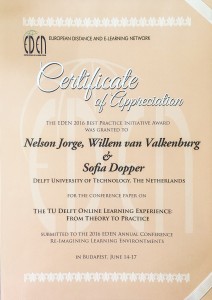Posts tagged best practice initiative award
The TU Delft Online Learning Experience: From Theory to Practice
 Paper presented at the EDEN Annual Global Meeting 2016 in Budapest, Hungary from 15-17 June 2016. At the conference Gala Dinner the paper received the EDEN 2016 Best Practice Initiative Award.
Paper presented at the EDEN Annual Global Meeting 2016 in Budapest, Hungary from 15-17 June 2016. At the conference Gala Dinner the paper received the EDEN 2016 Best Practice Initiative Award.
Introduction
In 2014 TU Delft started an innovation programme to educate the world and improve quality of education based on online learning. The programme included open (OpenCourseWare and MOOCs) and online (Professional Education, Bachelor and Master) courses. Lecturers of TU Delft have shared their knowledge in MOOCs with more than 750,000 learners around the world. Next to the open courses, more than 800 learners enrolled in our online courses. Adopting new instructional strategies based on online learning elements has had a very positive impact in TU Delft’s overall education, benefiting traditional on campus education and contributing to the changing need in educating engineers (Kamp, 2014). Naturally, blended learning has arisen on campus, where online learning materials are reused in a flipped classroom approach with very positive results: higher completion rates, higher average grade, more flexibility for students to interact with the course material and more flexibility for teachers in choosing which elements to include in the interactive classroom sessions (van Valkenburg, 2015).
The development of TU Delft online courses is based on the Online Learning Experience (OLE), a pedagogical model that supports the development of our courses and strives for increasing quality. The creation of the OLE was an important step for TU Delft, contributing to the development of online courses in a more systematic and consistent way, guiding all course development teams through the realisation of several shared educational principles.
Last year, when we presented the OLE at the 2015 EDEN Conference in Barcelona, we were still at an early stage of its development, collecting fundamental background to support it and feedback from online learning experts. Although we only had a collection of ideas translated into 8 principles, it was clear that the model needed to be flexible in order to accommodate many educational scenarios that coexist among TU Delft’s Faculties, but with a clear and useful purpose to help improve the quality of our online education (Jorge, Dopper & van Valkenburg, 2015). This paper describes how the OLE is applied in practice.The main goal of the OLE is to improve the quality of our online education by setting course design and development principles to support course teams. At the same time, the OLE can be used as a tool to promote reflection before the course starts to set expectations, and in the end to evaluate and plan improvements for the next run. In the next sections we’ll describe the OLE in both ways – as course design principles (guidelines) and as a tool (the radar graph).
Reference
Jorge, Nelson; Van Valkenburg, Willem; Dopper, Sofia (2016). The TU Delft Online Learning Experience: From Theory to Practice in Teixeira, Szucs and Mazar (2016). Conference Proceedings EDEN 2016 Annual Conference. ISBN 978-615-5511-10-3. License CC-BY 4.0
Download
- Download Paper (PDF)
- Explaining the model (PDF)
- Prezi slides
video of teacher’s perspective of Online Learning Experience:
